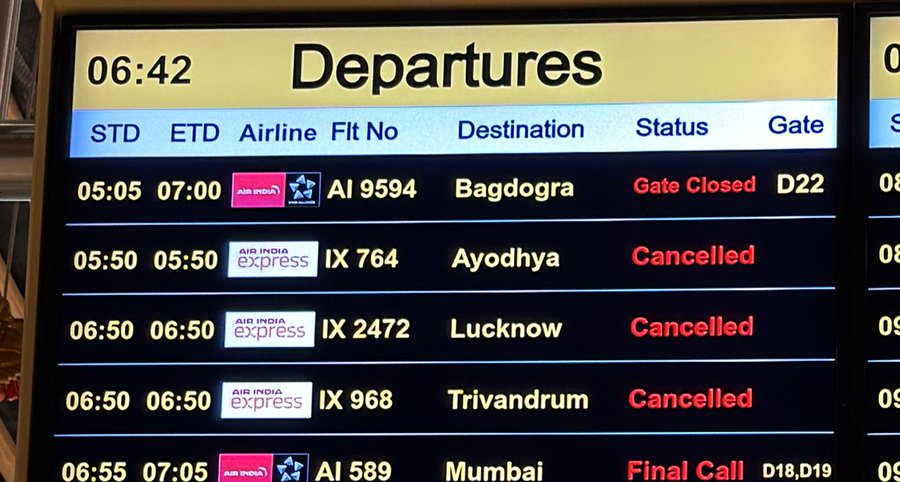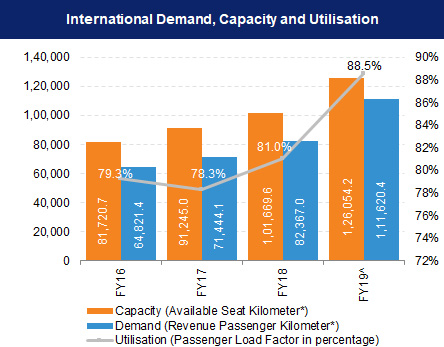9th May,2024
Latest updates:
- Recent events at Air India Express, such as the firing of at least 30 cabin crew members and the cancellation of multiple flights as a result of employee absenteeism, highlight the airline's deepening crisis. The fact that the management gave the staff a deadline of 4pm by which they had to return to work shows how serious the situation is.
The impact of the disruptions is substantial, impacting both passengers and the airline's operations, with 74 flights cancelled today alone. Considering that it is a division of the now-Tata Group-owned Air India, these difficulties are a major blow to the low-cost airline.
The management's attempts to resolve the issue quickly and get the airline's operations back to normal are demonstrated by the firing of employees and the threat of additional action.
Nonetheless, these incidents will probably have a ripple effect on the aviation sector, highlighting how crucial efficient management and staff involvement are to the continuous operation of airlines.
The Rising Phenomenon of Mass Sick Leaves in Indian Aviation
The Indian aviation industry, which is a vital part of the country's infrastructure, is currently dealing with a number of issues. As more than 300 cabin crew members took "mass sick leave" today to prove what they saw as airline management went wrong, more than 70 Air India Express flights were cancelled. This incident comes after a similar one last month, when Vistara had to cancel multiple flights because a large number of pilots reported being sick.

The Indian Aviation Industry at a Glance
The Indian domestic aviation market is now the third largest in the world, thanks to the industry's rapid growth. By 2024, it is anticipated to surpass the UK to take the third spot in the world.With a $72 billion gross value-added contribution to the GDP, the industry generates over 4 million jobs, which makеs up 5% of the GDP. With a bid of Rs 18000 crore for the national carrier, which includes Air India Express and a 50% stake in Air India SATS, the Tata Group acquired Air India, causing a dramatic change in the industry.

Grievances of Air India Express Staff
The specific grievances of the Air India Express staff include:
- concerns over job security, salary, and respect for seniority post-Tata takeover.
- There have been allegations of a stark departure from commitments made during the acquisition, with several employees with impeccable records being fired, contrary to assurances of no termination for two years post-acquisition.
- Employees have also reported a lack of equality in treatment, with internal job postings being filled by external candidates, bypassing qualified internal candidates.
Employee unrest and discontent have grown as a result of these grievances, which has affected morale and the productivity of the business.
Industry Standards and Employee Welfare
The aviation industry's concerns have shifted to employee welfare as a result of recent events. The unhappiness among Air India Express employees is part of a larger pattern of complaints that have been simmering for some time, rather than being an isolated incident. The Vistara incident from last month and the cancellations of Air India Express today highlight the need to review employment policies and industry standards. It calls into question the viability of the existing working environment and how to strike a balance between staff welfare and cost-cutting measures.
For more on the Vistara Incident, read: Vistara Flight Fiasco:Why Flights Are Cancelled, Delayed, With Crew Reporting Sick Leave?
Impact on Operations
The operational impact of such mass sick leaves is profound. Not only do they lead to immediate flight cancellations and delays, but they also affect the airlines' financial health and customer service reputation. With over 70 cancellations, the Air India Express fleet was suffering. The ripple effect extends to connected services like airport operations and logistics, highlighting the delicate ecosystem of the aviation industry.
#AirIndiaExpress ✈️cancels over 70 flights as crew members went on 'mass sick leave' to protest mismanagement. Discontent among cabin crew grows amidst merger talks. Passengers urged to check flight status before heading to the airport. #AirIndiaExpress #FlightDelay pic.twitter.com/OhU4hiwN1T — VYGR News (@Vygrofficial) May 8, 2024
Regulatory Oversight
These incidents underscore the importance of regulatory oversight in ensuring fair labour practices. The Ministry of Civil Aviation's involvement in monitoring the situation suggests a recognition of the potential systemic issues within the industry. It also points to the need for stronger mechanisms to prevent such crises and protect the interests of both employees and passengers.
Crisis Management
In response to the disruptions, airlines have had to employ various crisis management strategies. These include deploying reserve crew, negotiating with employee unions, and communicating with affected passengers. The effectiveness of these measures is crucial to maintaining customer trust and operational continuity.
Long-term Solutions
To prevent future occurrences, airlines must consider long-term solutions. This could involve revising salary structures, improving working conditions, and fostering better management-employee relations. Addressing the root causes of dissatisfaction is key to creating a more resilient and motivated workforce.

Viewpoint of the Passenger
These cancellations can be very inconvenient for passengers. It is crucial that they are aware of their rights and the compensation to which they are entitled. With many people sharing their anger on social media today, airlines should be required to maintain open lines of communication and offer sufficient assistance to individuals impacted by the cancellations.
The Aviation Industry's Future
In the long run, these incidents might mark a turning point for India's aviation sector. They could have an impact on investments in human resources, policy modifications, and the adoption of more environmentally friendly business models. Establishing a climate that allows airlines to prosper without sacrificing worker happiness or customer service should be the aim.
To sum up, the recent widespread sick leave in the Indian aviation sector serves as a wake-up call. They emphasise the necessity of a well-rounded strategy for overseeing airline operations, one that views worker welfare as a vital component of success. To guarantee a smooth journey ahead for everyone, the industry must aim for harmony between profitability and fair labour practices as it navigates these turbulent times.
Media Sources: Multiple agencies
ⒸCopyright 2024. All Rights Reserved Powered by Vygr Media.























